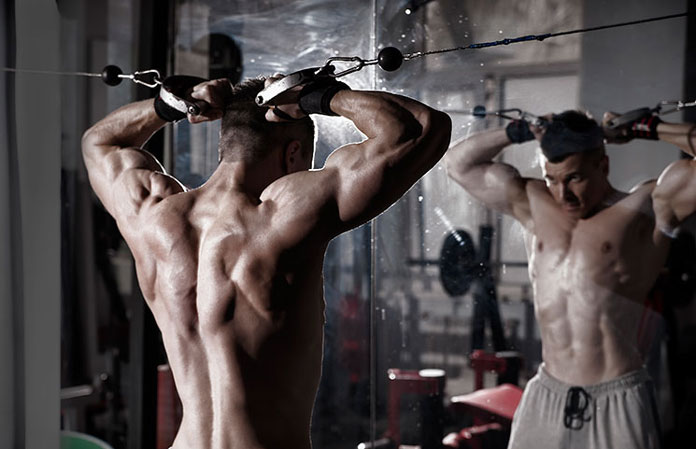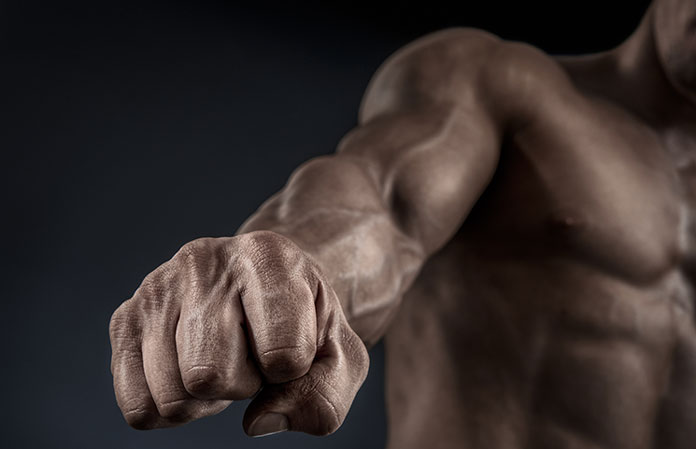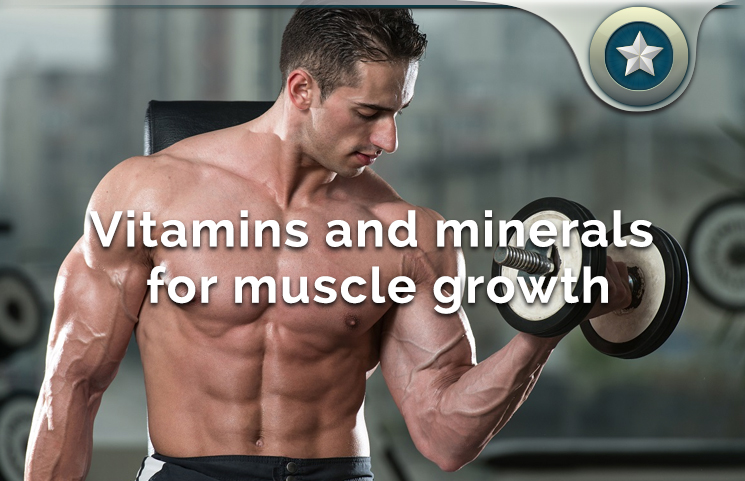About Best Vitamins And Minerals For Muscle Growth
People go to the gym not only to burn excess fats in the body but also to gain muscle growth. In this article, we will discuss the best vitamins and minerals for muscle growth and how these nutrients contribute to your muscle mass.
Although the body has different types of muscles, including the cardiac muscle, we will discuss the skeletal muscles exclusively.
The structure of the skeletal muscles is comprised of the sarcomeres and myofibrils that form the muscle fiber. Muscle growth, also known as muscle hypertrophy, refers to increase in density, mass, and change in shape of the muscle.
Muscle growth also entails development and function of the muscle cells. Muscle growth is an important aspect of life.
Lean women who gain muscle growth will appear tighter and firmer. Men who add to their muscle mass while remaining thin will appear stronger and more athletic.
Muscle growth is also known to improve the daily functioning of the body. The metabolic activities of the muscle will influence the way the body utilizes its nutrients. Various factors affect the rate at which muscle increases in density and mass. The type of exercises you perform and your nutritional intake affect the growth of skeletal muscle.
During weight lifting, the muscles get damaged by micro tears that occur in the fibers. During rest, the body rebuilds by repairing the damages that arise every time you curl or press.
The process of rebuilding and strengthening the muscle requires a proper supply of fuel in the form of vitamins and minerals. Discussed below are some of the best vitamins and minerals for muscle growth.

1. Vitamin D
The effects of vitamin D have been underestimated for so long. The vitamin is only known for its role in supporting bone health.
However, a recent study has found the link between vitamin D intake and the increase in muscle mass.
The study revealed that individuals who are deficient in vitamin D tend to have more fatty muscles than those with adequate amounts. Vitamin D is also essential for your performance in the gym.
The vitamin controls the function of the nerves that connect to the muscles. Vitamin D deficiency can lead to the inflammation of the connection between the nervous system and the muscles.
As a result, your performance in the gym will award minimal results. The daily recommended dose of vitamin D in an adult is 600 I/U. Depending on where you live, basking in the sun can provide you with sufficient vitamin D required for a day.
The fact that vitamin D plays a significant role in the absorption and utilization of calcium and phosphorus in the body makes it essential for muscle growth.
Calcium is required for the process of contraction and relaxation of the muscles. Phosphorus also has a role in the production of ATP and energy metabolism.
Besides sunlight, you can also acquire vitamin D from other sources such as fortified milk, whole eggs, shrimp, and salmon.
2. Vitamin A
Most people only recognize vitamin A for its role in eyesight. Other benefits that may result from vitamin A have been ignored.
Vitamin A is an essential vitamin to bodybuilders and athletes because it is involved in the process of protein synthesis.
Proteins are the primary building blocks of your muscles. As the level of protein synthesis increases, the concentration of vitamin A available in the body lowers.
The occurrence is because vitamin A is an essential requirement for the breakdown of proteins during muscle repair.
Vitamin A is also involved in the functioning of the testosterone hormone, which is the body's most important hormone for muscle growth. A study was recently conducted on teenage boys who had delayed puberty.
The boys were put on vitamin A supplements, and later it was observed that they produced similar maturity to those who were given exogenous testosterone.
The study concluded that vitamin A could be used to stimulate the production of the testosterone hormone in the body.
Another role played by the vitamin during muscle growth involves providing the muscle with structural strength by promoting bone development and stimulation of the muscle cells to mature faster.
Foods that are rich in vitamin A include carrots, lettuce, squash, sweet potatoes, and apricots. You can also obtain the vitamin from the consumption of liver and fish.
3. The B Vitamins
An array of the B vitamins is crucial for muscle growth and development. Thiamine, also known as vitamin B1, takes part in protein metabolism and hemoglobin synthesis.
Hemoglobin is the red pigment in the body that is responsible for transporting oxygen to different muscles in the body, including the muscle cells.
Without sufficient oxygen supply, healthy growth of the muscle cells will be compromised. Foods high in vitamin B1 include hibiscus tea, spirulina, and cereals such as corn and rice.
Another vitamin under the B complex is riboflavin, also known as vitamin B2. Riboflavin takes part in various biological processes in the body, including glucose metabolism, fatty acids oxidation, and protein metabolism. The B2 vitamin can be sourced from different foods such as eggs, milk, cheese, and peas.
The B3 vitamin is essential for energy production. It is also involved in the maintenance of the nervous system. Foods high in niacin include legumes, fish, potatoes, and milk.
Vitamin B6, also known as pyridoxine, supports muscle growth by promoting protein metabolism and carbohydrate utilization. Pyridoxine can be acquired from different foods such as brown rice, fish, and butter.
Cyanocobalamin, also known as vitamin B12, is essential for the growth and maintenance of the nervous system.
The vitamin also takes part in the breakdown of fats and carbohydrates in the body. The B12 nutrients can be sourced from different foods such as poultry, beef, chevon, liver, and milk.
Biotin takes part in amino acid metabolism. The amino acids are the building blocks of proteins which form the muscle. Vitamin B7 can be acquired from foods such as egg yolk, beef liver, and yeast.
4. Vitamin E
According to a study that was conducted on muscle growth, antioxidants play a significant role in the growth of muscles.
Vitamin E is the best known natural antioxidant. The vitamin works by destroying free radicals that can cause muscle breakdown.
The free radicals stimulate the synthesis of pro-inflammatory cytokines that interfere with the process of muscle development.
Cytokines interfere with muscle development by preventing the activities of the cell growth hormones and insulin-like growth factor, which are essential for muscle growth.
Supplementing yourself with the vitamin after a long day in the gym can boost the process of muscle repair.
Besides being involved in muscle growth, vitamin E has other health benefits. It increases the performance of the cardiac system together with the body's defense system.
Vitamin E can also help in the prevention of cancer development in the body. Top vitamin E rich foods include sunflower seeds, wheat germ, spinach, avocado, and almonds. You can also get vitamin E oils such as palm oil.
5. Vitamin C
Experts recommend vitamin C to individuals who wish to grow their muscle mass. Also known as ascorbic acid, vitamin C has several roles in the body. It is a water soluble vitamin that is crucial for healthy growth and development of the muscle cells.
The vitamin is also rich in antioxidants that help destroy free radicals that are harmful to the body. The vitamin also gets rid of toxins and chemicals that gain access to the body from the environment.
Ascorbic acid is essential for the growth and repair of damaged body tissues. The vitamin takes part in the synthesis of collagen, a protein that is used to make tendons and ligaments.
Vitamin C is also essential for repair and healing of damaged muscles. Another role of vitamin C in muscle growth involves the prevention of cortisol production.
Studies suggest that weight lifting can lead to the manufacture of cortisol in the body. Cortisol production can lead to muscle damage through the breakdown of muscles for energy production.
The hormone also promotes the deposition of fats around the abdomen. Cortisol is known to reduce muscle repair and recovery from damages caused by weight lifting. The hormone interferes with the delivery of nutrients to the muscle tissue.

6. Calcium
According to health experts, calcium is one of the most vital nutrients required by the bones and muscles for proper functioning. During weightlifting, your muscles contract and calcium facilitates the biological process.
Muscle contraction occurs through a process described as sliding filament theory. During this process, the myofibrils hold one another and slide, leading to muscle contraction. Calcium is required for this process to take place.
The myofilaments involved in the contraction process include actin and myosin. Low calcium levels in the body can cause you to experience fatigue during workouts. Fatigue is one of the leading limiting factors during exercises. The performance of actin and myosin can also be compromised by the lack of calcium in the body.
As a result, the force of muscle contraction is drastically reduced. The recommended daily intake of calcium is 1,200 mg.
Calcium can be sourced from different foods such as green vegetables, fortified milk, and dairy products. Calcium can also be obtained from supplements. It is advisable to use supplements that contain vitamin D for maximum effects.
7. Magnesium
Magnesium is known as the energy-boosting mineral. Studies have shown that lack of sleep and high-stress levels can lead to reduced muscle growth.
Magnesium helps the mind and the body in general to relax. The mineral is also thought to enhance the absorption of calcium from blood to the body tissues. Relaxation of the body and mind is vital for muscle recovery.
The mineral increases the breakdown and absorption of nutrients in the body. Magnesium and calcium need each other in the body to perform their roles properly. While calcium makes the muscles contract, magnesium makes them relax.
The mineral can be sourced from different foods such as spinach, brown rice, avocado, and mackerel.
8. Iron
Studies have shown that iron deficiency in the body can lead to detrimental effects on muscle development. The mineral is required in the production of red blood cells and also in the transportation of oxygen to other parts of the body.
Individuals who are iron deficient will experience shortness of breath and light-headedness during workouts in the gym. When iron levels in the body are below the minimum limit, you may need iron supplementation.
Consuming diets high in iron can help maintain its levels within the required range. Iron can be acquired through the consumption of dark leafy vegetables and animal proteins. It is important to note that iron supplements are related to side effects such as constipation. You should use them with caution.
9. Zinc
Zinc is another vital mineral in muscle development. If you wish to develop a large muscle mass, then consider taking foods high in zinc.
Besides being involved in muscle growth, Zinc also contributes to sexual health. The mineral has been shown to increase sperm production and libido.
Foods that are rich in zinc include spinach, beef, oysters, and cashew nuts. An overdose of zinc can lead to certain side effects related to the digestive tract, so be careful not to overdo it.
10. Folic Acid
Folic acid is a unique vitamin that is recommended for pregnant mothers. Folic acid helps prevent the development of neural tubes in pregnant women. Folic acid also boosts the growth of cells as well as the prevention of anemia.
Foods high in folic acid include lentils, which provide 90 percent of the daily recommended dosage. Other foods that are rich in folic acid include black beans, spinach, asparagus, and pinto beans.

Vitamins And Minerals For Muscle Growth Review Summary
Vitamins and minerals are vital for healthy functioning of the body’s cells. Food sources can be deficient in minerals and vitamins that are essential for muscle growth. In such cases, it is advisable to turn to supplements or try dietary changes.










i do not have any compain about vitality vitamins and minerals